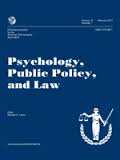
A person’s cognitive processing style may affect his or her decision to accept a plea bargaining more so than his or her values. This is the bottom line of a recently published article in Psychology, Public Policy, and Law. Below is a summary of the research and findings as well as a translation of this research into practice.

Featured Article | Psychology, Public Policy, and Law | 2017, Advance Online Publication
Logical but Incompetent Plea Decisions: A New Approach to Plea Bargaining Grounded in Cognitive Theory
Author
Rebecca K. Helm Cornell University
Valerie F. Reyna Cornell University
Abstract
Although much research considers the cognitive processes involved in legal decision making of jurors and judges, decisions to accept or reject plea bargains have received far less attention. We examine decisions in plea scenarios to test predictions of Fuzzy-Trace Theory regarding how cognitive processing style (specifically, greater reliance on gist or verbatim representations) affects plea decisions and how this could lead to suboptimal decision making, especially among defendants who are young adults. Results support Fuzzy-Trace Theory’s predictions by showing that the type of mental representation relied on by an individual (gist or verbatim) predicts plea bargain decisions—with those relying on gist being more influenced by categorical meaning-based distinctions, such as being guilty versus innocent or getting a felony versus misdemeanor. Importantly, results suggest that differences between the 2 groups are not caused by a difference in values but by the fact that individuals relying on verbatim representations are making decisions that do not reflect their underlying values, due to a “hyper-rational” reasoning process. These results reveal a new threat to competent plea decisions—a logical reasoning process that is arguably not fully competent—which has implications for the current plea bargaining system.
Keywords
competence, plea bargaining, criminal adjudication, fuzzy-trace theory, decision making
Summary of the Research
“Plea bargaining—a process in which a person accused of a crime pleads guilty to a lesser crime in order to receive a lesser punishment—is a widespread practice in the American criminal justice system. In 2014, 97.1% of federal criminal cases that were resolved were settled through pleas, with only 2.9% being adjudicated in bench or jury trials. Despite the prevalence of plea bargaining, it remains a largely “unregulated industry” in the sense that prosecutors have a wide latitude in setting the terms of pleas, with little judicial regulation. The law requires that guilty pleas must be made knowingly, intelligently, and voluntarily (e.g., Brady v. United States, 1970), but there has been relatively little research about the factors that make a plea knowing or intelligent” (p. 1).
“As well as requiring that a defendant actually makes a knowing, intelligent, and voluntary decision, the law regulates whether an individual has the ability to make such a decision using competency standards. Certain defendants are not competent to make plea bargains under the adjudicative competency standard. This standard is based on the Supreme Court decision in Dusky v. United States (1960). In Dusky, competence to proceed was defined by the court as the defendant’s ability to consult rationally with an attorney to aid in his own defense and to have a rational and factual understanding of the charges against him. Previous work has examined the concept of adjudicative competence and outlined specific abilities that the law is concerned with, classifying them into three psycholegal constructs— understanding (basic comprehension of the purpose and nature of the trial process), reasoning (capacity to provide relevant information to counsel and to process information), and appreciation (ability to apply information to one’s own situation in a manner that is neither distorted nor irrational) … In this study, we use Fuzzy-Trace Theory (FTT), a psychological theory of memory and decision making, to examine ways in which some people may lack the capacity to make competent plea decisions in criminal trials despite having understanding, reasoning, and appreciation in the traditional legal senses” (p. 1).
“Empirical research has confirmed that risk preferences and probabilities of conviction influence defendants. However, research has also shown that this is not all that is important to defendants when making plea decisions. Other factors may be important to defendants when deciding whether to plead guilty, such as their factual guilt or innocence, the charge offered by the prosecutor (e.g., felony or misdemeanor), and short-term benefits from pleading guilty. Plea decision making is, therefore, complex and requires that defendants appropriately apply their values (meaning what they consider to be important) to weigh these different considerations and make decisions that truly reflect their values” (p. 2).
“When defendants are presented with information about a plea deal, the way that they remember and reason about that information is likely to shape the decisions that they make. According to FTT, people encode information in two types of memory representations—verbatim and gist. Verbatim memory is memory for precise surface details; for example, memory representations of exact words, numbers, or pictures. Gist memory is memory for essential meaning, the “substance” of information irrespective of exact words, numbers, or pictures. When making decisions, individuals retrieving and relying on gist representations process information in a fuzzy and impressionistic way (known as gist processing). Individuals retrieving and relying on verbatim representations process information in a more precise analytical way (known as verbatim processing). FTT predicts that certain groups (e.g., the young and inexperienced, and those with high levels of autistic traits) will rely more on verbatim representations of information than gist representations, and that verbatim processing can result in suboptimal decision making. Individuals who rely on verbatim processing may lack the ability to make informed plea decisions due to developmentally inferior cognitive processing that can lead to unhealthy risk taking and decision making that does not reflect values” (p. 2).
“In the context of plea bargaining, FTT predicts that defendants relying on verbatim processing are more likely to conduct a superficial trade-off of risks and rewards. This trade-off would be likely to be influenced by the probability of conviction and the magnitude of potential outcomes, as opposed to the importance of categorical meaning-based distinctions such as the distinction between a felony and a misdemeanor or between guilt and innocence.
Decisions in which the outcome of pleading guilty is a misdemeanor conviction and the outcome if convicted at trial is a felony are decisions in which there is a categorical difference between outcomes. From a gist perspective, a felony conviction is not just worse than a misdemeanor in some quantifiable way— one felony is not equivalent to, say, two or three misdemeanors. A felony has a qualitatively as well as quantitatively different effect on a person’s life. This means that the distinction is likely to influence those relying on gist more than those relying on verbatim processing, specifically in cases involving small risks (e.g., when the probability of conviction at trial is low). For defendants relying on gist, the possibility of a felony conviction should supersede more fine-grained considerations of magnitudes of risk and reward, whereas for individuals relying on verbatim processing, it would just be another aspect of a risk/reward calculation” (p. 2-3).
“In this study, we use a risky-choice framing task to probe which participants rely more on gist processing and which participants rely more on verbatim processing, and relate this to decisions in hypothetical plea situations. We investigate two classes of questions. First, how does reliance on gist and verbatim processing influence plea decisions? Second, does reliance on verbatim processing produce decisions that reflect values?” (p. 3).
“Participants were 410 adults recruited from the participant pool at Cornell University (n = 210) and from Amazon Mechanical Turk (n = 200)… In order to investigate whether the individuals in our sample were individuals who may have to make plea decisions we analyzed responses to questions about engagement in crime. Overall in our sample, 209 participants had committed at least one of the crimes that we asked them about (drinking and driving, driving without a license, stealing cars and going for joy rides, taking drugs and underage drinking) or had been convicted of a crime in the past (164 in our Cornell sample, and 45 in our Mechanical Turk sample). Thirty-three participants said that either they or a close family member (meaning a parent or sibling) had made a real plea decision in the past (7 from our Cornell sample and 26 from our Mechanical Turk sample)” (p. 4).
“[W]e tested the influence of probability of conviction, sentence-length distinction (facing a shorter sentence at plea than the sentence if convicted at trial), conviction-charge distinction (facing a misdemeanor at plea compared to a felony if convicted at trial), and guilt/innocence on plea decisions. We predicted that individuals relying more on verbatim processing would be less influenced by guilt/innocence, less influenced by the distinction between a misdemeanor and felony when the probability of conviction was low, and more influenced by superficial differences in sentence length. We found support for two of these predictions. As predicted by FTT, individuals thought to be relying most on verbatim processing were less influenced by guilt or innocence or by the distinction between a misdemeanor and felony when the probability of conviction was low” (p. 10).
Translating Research into Practice
“If confirmed by future research, the findings of this study could have important implications for the criminal justice system, particularly as a disproportionate amount of crime is committed by young adults, who may still be transitioning from verbatim processing to gist processing (Bureau of Justice Statistics, 2016). Results suggest that plea decisions are influenced by cognitive processing style; in particular, reliance on gist or verbatim mental representations. This is important for the criminal justice system because it suggests that plea decisions in certain groups may be driven by a predisposition to rely on fine-grained quantitative distinctions, rather than qualitative, categorical distinctions, and bottom-line meaning. This means that certain individuals—specifically those with a strong disposition toward verbatim processing and especially those who are also sensitive to reward amounts—may not be driven by their values when making plea decisions. For such individuals, incentives could become coercive. This is problematic regardless of age but also due to developmental trends in cognitive processing styles” (p. 11-12).
“This lack of connection between values and plea choices is a particular threat for adolescents and young adults who are known to rely less on gist processing than older adults, indicated by less frequent standard framing, but who are sometimes asked to make plea decisions that will affect them for the rest of their lives. Adolescents and young adults are making decisions at a stage in their development that predisposes them to rely on verbatim detail rather than meaning-based processing that takes into account qualitative dimensions and values. Importantly, our results suggest that those relying on verbatim processing take into account whether they are guilty or innocent less often when making plea decisions, even when they state that this is important to them” (p. 12).
“[T]his research should inform the standard that is used to determine whether an individual is competent to plea bargain. Current standards rely on traditional ideas about cognitive competence, relying on understanding (a basic comprehension of the purpose and nature of the trial process), reasoning (the capacity to provide relevant information to counsel and to process information), and appreciation (the ability to apply information to one’s own situation in a manner that is neither distorted nor irrational). This research suggests that a more expansive view of competence should be considered, building on these constructs but going beyond them. People relying on verbatim processing are likely to “understand” the legal process in the sense that they can parrot back instructions, be able reason in a traditional sense (balancing risks against rewards), and recognize the explicit risks and rewards that apply to their situation. However, they may not deeply appreciate the noncompensatory impact of a felony conviction or the death penalty. Moreover, due to their cognitive processing they may not cue principles that are important to them when making the decision (e.g., a desire to not plead guilty to a crime they did not commit or a desire to avoid risking a felony). This means that people with a greater level of reliance on verbatim processing may be able to apply legal information and knowledge of risks and rewards to their decisions, but may be less able to apply relevant values. Such a cognitive disposition is temporary in many cases because of developmental immaturity. In any case, such reasoners could be argued to be “logical, but incompetent,” in the sense that they make decisions that do not adequately reflect their values, violating a fundamental precept of informed decision making” (p. 12).
Other Interesting Tidbits for Researchers and Clinicians
“These results regarding categorical differences, such as those between misdemeanors and felonies, may have implications for when the death penalty is a potential outcome at trial. This is because verbatim processors would be more likely to neglect categorical distinctions (such as between life in prison and a risk of death if convicted), even when this does not reflect their values. Although it seems extreme to fail to appropriately weigh a risk of death, research has shown adolescents (thought to rely on more verbatim processing) trade off risk and reward when making life or death decisions, such as whether to risk HIV infection” (p. 10).
“These results support FTT’s predictions that groups predisposed to rely on verbatim representations are less likely to be affected by the categorical distinction between guilt and innocence when making plea decisions due to their cognitive processing style, not due to their values per se. This finding can provide insight into previous findings in the plea bargaining literature. For example, it has been shown that adolescents plead guilty to crimes that they did not commit more often than adults do. Combined with prior research showing that reliance on gist develops from adolescence to adulthood, the current research suggests that adolescents’ greater reliance on verbatim processing would lead them to neglect meaning-based, qualitative concepts, such as guilt or innocence, in their decision making. Note that this study did not specifically show that reliance on verbatim processing leads to pleading guilty more to crimes that were not committed, but it did show that individuals relying on verbatim processing are less likely to be influenced by whether they are guilty or innocent when deciding whether to plead guilty” (p. 11).
Join the Discussion
As always, please join the discussion below if you have thoughts or comments to add!






















